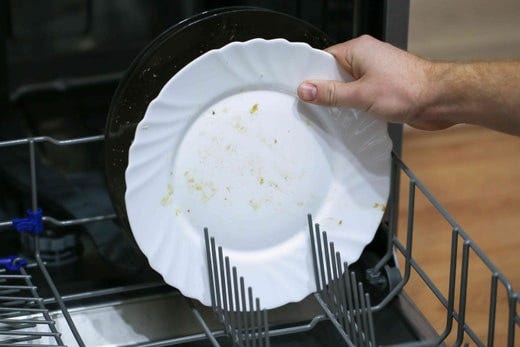Common Causes of a Dirty Dishwasher

A dishwasher is a time-saving marvel used to clean dishware, cookware, and cutlery automatically. Unfortunately, like any other appliance, its efficiency can be compromised by various common issues, leading to less-than-spotless dishwashing results.
Lingering food particles, clogged spray arms, unclean filters, improper use of dishwasher programs & cycles, and many other things can lead to a dirty appliance.
A deep understanding of these common causes helps you equip yourself with the essential dishwasher troubleshooting tips and knowledge to ensure your device is consistently clean, guaranteeing sparkling clean dishes, pots, pans, and silverware after every wash.
Continue reading this article to learn about the common reasons for a dirty dishwasher, which is crucial for maintaining a decent dishwasher maintenance.
1. Food Residue
When you don't scrape the dishes to remove the excess food particles before putting them in the dishwasher, the large and sticky food residue often gets stuck on the plates, utensils, and glassware, finding their way into the dishwasher's nooks and crannies or at the bottom of the appliance.
Over time, this residue accumulates, affecting water flow and compromising the dishwashing process. Apart from unsightly deposits on your dishware, it can also create a breeding ground of germs and bacteria that produce unpleasant odors.
To prevent this, regularly use Finish Ultimate Tablet and Dishwasher Cleaner to remove tough and greasy food particles and stains.
2. Dishwasher Filter
The dishwasher filter plays a crucial role in its functionality by trapping food particles, residue, and other debris and preventing it from recirculating.
When these filters are clogged or dirty, water flow is impeded, resulting in subpar cleaning performance and the accumulation of grime within the dishwasher itself.
Regularly cleaning these filters is essential to prevent the dishwasher from clogging, ensuring it tackles every load with the thoroughness it was designed for. Additionally, don’t forget to use Finish Dishwasher Salt, which softens water to keep your kitchenware spotless after each wash cycle.
Learn about dishwasher filters and how to clean them, from spotting the signs that they’re overdue to cleaning them to the different filters available.
3. Low Water Temperature
Hot water cleans better than cold water. A hot water wash cycle is recommended to ensure your dishwasher stays pristine, following more thorough, effective, and best cleaning results.
To ensure that water is at least 120 degrees Fahrenheit by the time it reaches the dishwasher:
- Check the water heater's temperature before using the dishwasher, and raise it if it isn’t hot enough.
- Let the hot water in your kitchen sink run for about two minutes before starting the dishwasher. It will bring hot water to your destination so that it is ready to be used by the dishwasher.
- Sometimes, hot and cold supply lines get inadvertently switched. Check under the kitchen sink to see if the lines are hooked up correctly.
Learn everything you must know about your dishwasher water temperature in Finish’s dishwashing temperature guidelines.
4. Dishwasher Detergent
Using a good quality and reliable dishwasher detergent, such as Finish, the leading dishwashing manufacturers' recommendation, is essential for keeping your dishes hygienic and clean.
It will help break down and remove food residue, grease, and other debris effectively, preventing the buildup of mineral deposits and soap scum inside the dishwasher.
Available in tablet, powder, and gel, Finish offers 100% unbeatable dishwashing performance that guarantees ultimate cleanness and shine every time.
Whether you are using the dishwasher for the first time or looking to switch your dishwasher detergent, deciding between the right detergent can often become difficult. Delve into the world of dishwasher detergent to find the one that works best for you.
5. Dishwasher Cleaning
Not frequently cleaning your dishwasher is also a major cause of making it dirty. Over time, food particles, grease, limescale, and various mineral deposits can accumulate in the dishwasher, clogging the inner workings and spraying arm, ultimately affecting the machine’s efficiency.
To ensure your dishwasher keeps giving sparkling results, clean the dishwasher regularly using Finish Dishwasher Cleaner, which deeply cleans the parts of the appliance you can't see, removes grease and limescale buildup in the pipes, and leaves it hygienically clean and fresh smelling.
.png?width=70&height=45&format=png&quality=50)